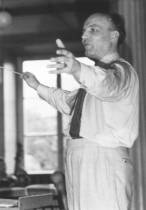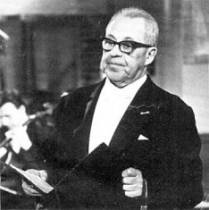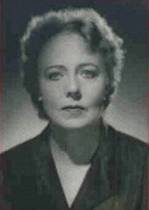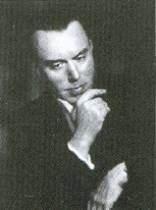
Fritz Lehmann
Born: May 17, 1904 - Mannheim, Germany
Died: March 30, 1956 - Munich, Germany
The esteemed German conductor, Fritz (Ludwig) Lehmann, studied at the Mannheim Conservatory and the Universities of Heidelberg and Göttingen.
Fritz Lehmann was a conductor in Göttingen (1923-1927), Hildesheim (1927-1938), and Hannover (1929-1938). In 1934 he became conductor of the Händel Festival in Göttingen, was the Generalmusikdirektor in Bad Pyrmont (1934-1938), Wuppertal (1938-1947), and Göttingen (1946-1950). He subsequently was a teacher at the Hochschule für Musik in Munich (from 1953). A consummate conductor, he led notable performances in both the operatic and symphonic literature, ranging from the Baroque period to the 20th century.
Gunthild Weber
Born: 1909 (?) - Germany
The German soprano, Gunthild Weber, was trained by the pedagogue Oscar Rees in Berlin.
In October 1934 Gunthild Weber made her debut in Berlin with Lieder recital. Since then she appeared regularly in Berlin as concert soloist. In 1936 she could be heard in Breslau and in Bremen, in 1938 in Basel. Since 1938 she gave a number of concerts in Hamburg and in Munich. She was married with the well-known Berlin’s choral conductor Günther Arndt (1907-1976), who led the Günther Arndt Choir. In addition, she worked in the years after World War II as pedagogue at the National College of Music Berlin, but still continued to appear in the concert hall. Thus she participated in 1952 in the Händel Festival in Halle (Saale). She became particularly estimated as outstanding interpreter of the vocal works of J.S. Bach. However she mastered a far intriguing repertoire in the areas of the oratorio, as well as Lieder singing.

Hermann Schey
Born: November 8, 1895 - Bunzlau in the former Prussian province Silesia,Germany
Died: August 21, 1981 - Switzerland
The Jewish Dutch bass-baritone, Hermann Schey, from German origine, studied in Bunslau on the the local gymnasium. He received his musical training from 1913 to 1915 in Berlin at the Hochschule für Musik with Professor Henry von Dulong. In 1915 he was drafted as a soldier and could continue his singing studies only after war ended.
Since 1922 Hermann Schey worked in Berlin as concert and oratorio singer. He was particularly admired for his Bach interpretations. Concert tours brought him great success in the European music centers. In 1929 he sang in Amsterdam with the Concertgebouw Orchestra under Willem Mengelberg the Kindertotenlieder by Gustav Mahler, and left so lasting impression that returned since then annually to Holland, particularly to perform the memorable performances of Matthäus-Passion (BWV 244) by J.S. Bach under Willem Mengelberg. In 1930 he undertook a big tour to Poland, Russia and the Balkan States, in 1932 he gave concerts in Paris, and in 1933 in Zurich. He gave the prmiere performances of several Lieder by th songs Swiss composer Othmar Schöck, and in 1930 sang in Berlin the bass-solo in the premiere of the cantata Das dunkle Reich by Hans Pfitzner. Being a Jew, he immigrated in 1934 to Holland and became in 1936 professor at the Conservatory of Amsterdam, but continued however his successful concert activity. When Holland was occupied in 1940 by the German army, he had to hide himself hidden until the end of the war. Then he resumed his career and participated in the Holland Festival and in further international festivals. Concert tours brought him to Germany, England, Austria and to Switzerland. In 1968 he made a triumphalen tour to Israel, and appered there at the Abu Gosh Festival. In addition he continued to work as a singing teacher. He spent his old age in Switzerland. 
Elisabeth Höngen
Born: December 7, 1906 - Grevelsberg, Westphalia, Germany
Died: August 1997
The German contralto, Elisabeth Höngen, appeared already for 15 years publicly as a violinist, before she studied German and music science at the University and at the Music College of Berlin. Her voice was trained by Hermann Weißenborn in Berlin.
Elisabeth Höngen made her debut in 1933 at the State Theatre of Wuppertal, and from there she came in 1935 to the Opera House of Düsseldorf, where she remained until 1940. Already in 1934 she made guest appearance with the Wuppertal Ensemble in Holland as Marcellina in Le Nozze di Figaro. In 1938 she was again in Holland, now with the Opera House of Düsseldorf to be heard as Fricka in Walküre. In 1937 she participated in Düsseldorf in the premiere of the opera Magnus Fahlander by Fritz von Borries. From 1940 to 1943 she was a member of the Dresden State Opera. Here she participated, among other things, in February 1942 in the premiere of the opera Die Zauberinsel by H. Sutermeister. In 1943 she started an engagement at the Vienna State Opera, (starting role: Ortrud in Lohengrin), to whose most prominent artists she belonged during the following 29 years. The singer was celebrated at Milan’s La Scala, at London’s Covent Garden (1947 and 1959-1960) at Teatro Colón of Buenos Aires, at the Grand Opéra Paris, in Amsterdam, Zürich, Berlin and Munich.
In 1951-1952 Elisabeth Höngen was active at the Metropolitan Opera New York (starting role: Herodias in Salome). She sang at the Metropolitan Opera also Waltraute in Nibelungen Ring and Klytämnestra in Elektra by R. Strauss. In Vienna she participated in 1965 in the premiere of Igor Stravinsky’s The Rake's Progress as Türkenbaba. She had important successes at the Salzburg Festival, including in 1950 in the title role of Benjamin Britten’s The Rape of Lucretia, in 1948-1949 as Orpheus of Gluck, in 1948 and 1956 as Marcellina in Le Nozze di Figaro, in 1949-1950 as Clairon in Capriccio by R. Strauss, in 1958 in the premiere of the opera Julietta by Heimo Erbse, in addition to many concert performances. The artist sang at the Festivals of Edinburgh and Bayreuth (1951 Fricka and Waltraute in the Nibelungen Ring) as well as at the Maggio Musicale Florence.
In 1957 Elisabeth Höngen was appointed as a Professor in the Vienna Music Academy (until 1960), however her great career continued. Until 1971 she appeared at the Vienna State Opera, where she presented to the audience 44 different roles at this house alone. As the last role she sang in the same year at the Viennese Volksoper Principessa in Suor Angelica by Puccini. Her rich, beautifully formed voice, with dramatic delivery and strength and her feeling for style excited admiration. Her talents were shown to their best in roles like Klytaemnestra in Elektra, Lady Macbeth, Herodias in Salome, Amme in the Frau ohne Schatten, and Ortrud in Lohengrin.

Walther Ludwig
Born: March 17, 1902 - Bad Oeynhausen, Germany
Died: May 15, 1981 – Lahr, Germany
The German tenor, Walther (or Walter) Ludwig, studied jurisprudence and medicine before deciding on a singing career. He studied voice at the University of Königsberg, where he made his debut in 1928.
From 1929 to 1932 Walther Ludwig sang at Schwerin, where he created in 1931 the title role in Friedemann Bach by Graener. From 1932 to 1935 he was the leading lyric tenor at the Berlin Stadtische Oper, being particularly admired as Belmonte and Tamino. He sang the same roles also at Glyndebourne in 1935 and Salzburg from 1948 to 1950. Guest appearances took him to Milan's La Scala, London's Covent Garden, Paris, Barcelona and the Vienna State Opera; likewise toured as a concert artist. He was best known for his Mozart roles. Other roles were Don Ottavio, Idomeneus, Loge and Wilhelm Meister.
From 1952 to 1969 Walther Ludwig was a professor at the (West) Berlin Hochschule für Musik. He also completed his medical studies in Berlin (M.D., 1971). He taught singing in Berlin from 1952 to 1969.
Lore Fischer
Born: May 27, 1911 - Stuttgart, Germany
The German contralto, Lore Fischer, studied singing and violin playing at the Musikhochschule of Stuttgart. She studied singing at the Musikhochschule of Köln by Maria Philippi.
In 1934 Lore Fischer gave her first concerts and became known now as soloist in oratorios and as Lieder interpreter. She appeared in the music centres in Germany (numerous concerts in Berlin, Hamburg, Hannover, Cologne and in more cities) and abroad. Thus she gave concerts in Paris (1938 and 1941), in Warsaw (1933), in Brussels (1938 and 1939), Amsterdam (1939 and 1941), in Graz (1938), and undertook in 1956 an expanded USA tour.
In 1942 Lore Fischer got married with the violist Rudolf Nel. With him and the composer Hermann Reutter she created the Lore-Fischer-Trio, which brought above all compositions of the Baroque period to the public. She lived in München-Gräfelfing, from where she went out to her expanded concert activity. Later she was appointed as a Professor at the Musikhochschule of Stuttgart.
Cantata BWV 170 Contralto: Elisabeth Höngen
Bayerisches Staatsorchester
Recorded at Amerikahaus, Munich, October 1951
Cantata BWV 189 (Georg Melchior Hoffmann?)
Tenor: Walther Ludwig
"Ensemble" Fritz Lehmann
Recorded at Bavaria Film-Ateliers Halle 4, August 1951
Cantatas BWV 19 & 79
Soprano: Gunthild Weber Contralto: Lore Fischer Bass: Hermann Schey
Berliner Motettenchor Berliner Philharmoniker
Recorded at Jesus-Christus-Kirche, Berlin, Januar 1952
|

